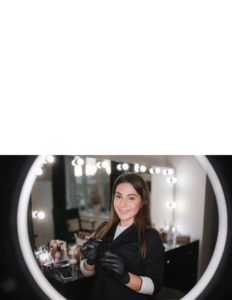The field of cosmetology is on the cusp of transformative changes, driven by technological advancements, evolving consumer demands, and a heightened focus on wellness and sustainability. As the beauty and personal care industry continues to expand globally, the future of cosmetology promises to be both exciting and challenging. In this article, we explore the key trends, innovations, and emerging opportunities that are set to shape the future of cosmetology.
1. Technological Advancements in Beauty
AI and Augmented Reality (AR) in Beauty Consultations
Artificial Intelligence (AI) and Augmented Reality (AR) are revolutionizing how cosmetologists and beauty brands interact with clients. Virtual beauty consultations, powered by AI, allow clients to try on makeup, hairstyles, or even skincare products through apps or smart mirrors before committing to a purchase or service. Companies like L’Oréal and Sephora have already introduced virtual try-on experiences, and this trend is expected to grow.
For cosmetologists, these technologies can enhance the client experience by offering personalized recommendations based on facial analysis, skin type, or style preferences. As AI and AR technologies become more sophisticated, cosmetologists will need to adapt and integrate these tools into their practice to stay competitive.
3D Printing and Customization
The future of beauty is all about customization, and 3D printing technology is playing a significant role. Imagine offering clients custom-made makeup, skincare products, or even hair accessories that are 3D-printed to suit their unique needs. Brands like Mink have already pioneered 3D-printed makeup, and this technology will likely become more accessible to professionals, enabling them to offer bespoke beauty solutions to their clients.
Smart Beauty Devices
The rise of smart beauty devices, such as skin analyzers and hair diagnostics tools, is another exciting development. These devices provide real-time data on skin conditions, hydration levels, or hair health, allowing cosmetologists to offer more precise treatments. The integration of Internet of Things (IoT) technologies in beauty devices will enable cosmetologists to track client progress and adjust treatments accordingly, leading to more effective results.
2. Sustainability and Eco-Friendly Practices
Consumers are increasingly prioritizing sustainability and eco-consciousness, and this shift is impacting the cosmetology industry. The demand for clean, cruelty-free, and environmentally friendly beauty products is growing rapidly, with clients seeking brands and professionals who share their values.
Green Beauty and Sustainable Products
The future of cosmetology will see a greater focus on using sustainable and ethically sourced products. Cosmetologists will need to be knowledgeable about ingredients, product packaging, and environmentally friendly alternatives. Brands are already moving toward biodegradable packaging, refillable containers, and waterless beauty products, which reduce the industry’s environmental footprint.
Eco-Friendly Salons
Eco-conscious consumers are also looking for salons that practice sustainability. Salons of the future will incorporate energy-efficient appliances, use non-toxic cleaning products, and focus on reducing water and energy consumption. Cosmetologists who embrace these practices will not only attract environmentally conscious clients but also reduce their operational costs in the long run.
3. Holistic and Wellness-Driven Beauty
The concept of beauty is evolving beyond aesthetics, with a growing emphasis on wellness and self-care. Clients are increasingly looking for beauty treatments that promote overall well-being, both physically and mentally.
The Rise of Wellness Salons and Spas
The future of cosmetology will see the fusion of beauty and wellness in more holistic ways. Wellness salons and spas that offer treatments focused on relaxation, mental health, and physical rejuvenation will become more popular. Services like aromatherapy, sound therapy, and meditation sessions may be combined with traditional cosmetology treatments to create a more comprehensive wellness experience.
Stress Relief and Mental Wellness
Cosmetologists will increasingly serve as wellness advocates, helping clients manage stress through beauty rituals. Offering services like scalp massages, facial acupuncture, or guided meditation during treatments can enhance the overall client experience and promote mental wellness. Beauty routines will be seen as a form of self-care, contributing to both inner and outer beauty.
4. Personalization Through Data and Genomics
In the future, beauty treatments will be more personalized than ever before, thanks to advances in data analytics and genomics. Personalization is already a significant trend, but as companies begin to integrate DNA-based skincare and genetic testing into their product lines, the possibilities for customization will expand exponentially.
DNA-Driven Skincare and Treatments
Cosmetologists may soon be able to offer treatments and products based on a client’s genetic makeup. Genetic testing can reveal predispositions to skin conditions, hair loss, or aging, enabling cosmetologists to create personalized skincare regimens tailored to the client’s genetic profile. This level of personalization could drastically improve the effectiveness of treatments and lead to more satisfied clients.
Data-Driven Beauty
In addition to genomics, data collected from wearable devices or apps can offer insights into a client’s lifestyle, environment, and daily habits. This data can help cosmetologists make more informed decisions about treatments, such as recommending products based on a client’s exposure to pollutants or UV radiation. Data-driven beauty will become a key factor in offering tailored, results-oriented services.
5. Remote and Virtual Cosmetology Services
The COVID-19 pandemic accelerated the shift toward remote and virtual beauty services, and this trend is likely to continue in the future. Virtual consultations, online beauty classes, and remote skincare or makeup advice are becoming more popular as clients seek convenience and safety.
Virtual Beauty Consultations
Even as salons reopen fully, virtual beauty consultations will remain a valuable option for clients who prefer the convenience of online services. Cosmetologists can offer personalized skincare routines, makeup tutorials, or hairstyling tips through video calls, expanding their reach beyond geographic boundaries.
E-Learning and Online Beauty Education
The future of cosmetology also involves the rise of online beauty education platforms. Aspiring cosmetologists or clients interested in learning beauty techniques can enroll in virtual courses, allowing for greater accessibility and flexibility in beauty education. Established cosmetologists can use this trend to create additional income streams by offering paid online courses or tutorials.
6. Inclusive Beauty
Diversity and inclusion are becoming essential aspects of the beauty industry, and the future of cosmetology will reflect this shift. Clients are looking for beauty services and products that cater to all skin tones, hair types, and genders.
Multicultural and Inclusive Beauty Practices
Cosmetologists will need to expand their knowledge of multicultural beauty practices to serve a more diverse clientele. This includes understanding different hair textures, skin types, and cultural beauty standards. The demand for inclusive beauty services will continue to grow, and cosmetologists who can offer specialized services for a wide range of clients will be in high demand.
Gender-Neutral Beauty
The future of beauty is also moving away from traditional gender norms. More clients are seeking gender-neutral products and services, and cosmetologists will need to adapt by offering inclusive and non-gendered beauty treatments. From haircutting techniques to skincare regimens, professionals must embrace a more fluid approach to beauty to meet the changing expectations of clients.
Conclusion: A Future Full of Possibilities
The future of cosmetology is an exciting blend of technology, personalization, sustainability, and wellness. Cosmetologists who embrace these trends and stay ahead of the curve will find themselves in a thriving industry with endless opportunities for growth. Whether it’s integrating AI and smart beauty devices, offering eco-friendly services, or creating personalized treatments based on data, the future of cosmetology is all about enhancing the client experience while staying aligned with global shifts in beauty and wellness.
By staying informed, continuing education, and adapting to new technologies, cosmetologists can position themselves for success in this rapidly evolving industry.
Are you ready to shape the future of beauty? Join Summit Salon Academy of Portland, the leading cosmetology school in Oregon, offers comprehensive education in various beauty disciplines, including esthetics. If you’re ready to turn your passion into a profession, click here to learn more about our programs and how to enroll




